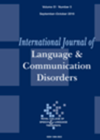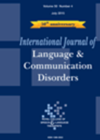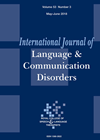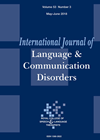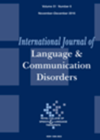
Journal Reviews
Positive practical communication skills for medics
Communication training for medical students generally focuses on communicating with unimpaired individuals. This article describes how a speech and language therapy department at the University of Gothenburg in Sweden trialled a new approach to teaching medical students. Fifty-nine undergraduate medical...
Comparison of linguistic profiles in three groups of children with hearing loss and specific language impairment
Spoken language deficits in children with hearing loss early in life are attributed to auditory speech perception limitations. It is assumed that hearing following cochlear implants (CIs) will improve these language deficits. However, the studies have shown that although cochlear...
Quality of life measurement tools in children with speech and language difficulties
The authors of this paper reviewed various quality of life measurement tools which are used to assess the effects of speech and language difficulties in children and adolescents. Measuring quality of life outcomes in children with these difficulties is not...
Literacy and communication skills of young offenders
This article elucidates the perceptions and experiences of young offenders about their own literacy and communication skills. Young offenders (YOs) are usually between the age of 14 and 16. It is estimated that more than 60% of these offenders have...
Impaired music perception in children with specific language impairment
This study compares musical skills of children with typical language development with those of children with specific language impairment. Both groups received a test consisting of a melody and a song identification along with a test battery to assess receptive...
Working with clients of communication disorders from culturally and linguistically diverse populations
Speech language therapists (SLTs) deliver evidence based services worldwide for communication disorders to culturally and linguistically diverse (CLD) populations. They have to modify their approaches and tailor them to the needs of their students / patients. This article studies the...
English language development in bilingual toddlers
It is known that bilingual children have a smaller vocabulary in each of their two languages than monolingual children and also take a little longer to reach the same levels as monolinguals on various grammatical tasks. The authors of the...
Relationship between ART and language development
Assisted Reproduction Technology (ART) and especially more invasive techniques of ART may be associated with an increase in neurodevelopmental problems including language delay. Some studies have reported slightly worse perinatal outcomes of IVF babies compared to naturally conceived babies. The...
Specific language impairment in bilingual vs monolingual children
Research has focused mainly on the specific language impairment (SLI) in monolingual children. This article focuses attention on the SLI in bilingual children. The study was conducted with bilingual children from Luxembourg and monolingual children from Portugal who all had...
Early habilitation for hearing impairment in children with Down syndrome
Approximately 40-80% of children with Down syndrome have hearing impairment in addition to speech and language impairment. The commonest cause of hearing impairment in young children is otitis media with effusion. This paper investigated the impact of early hearing loss...


